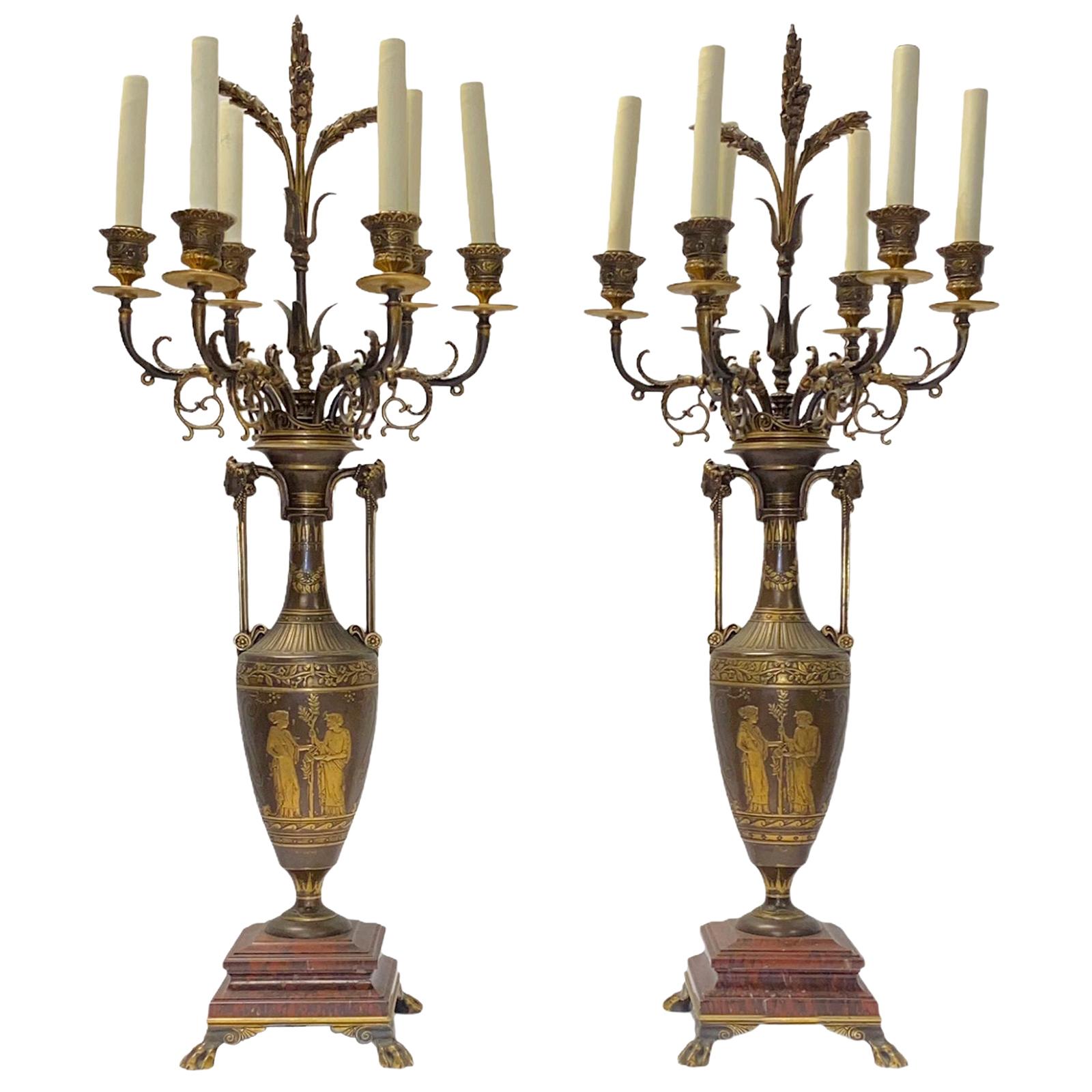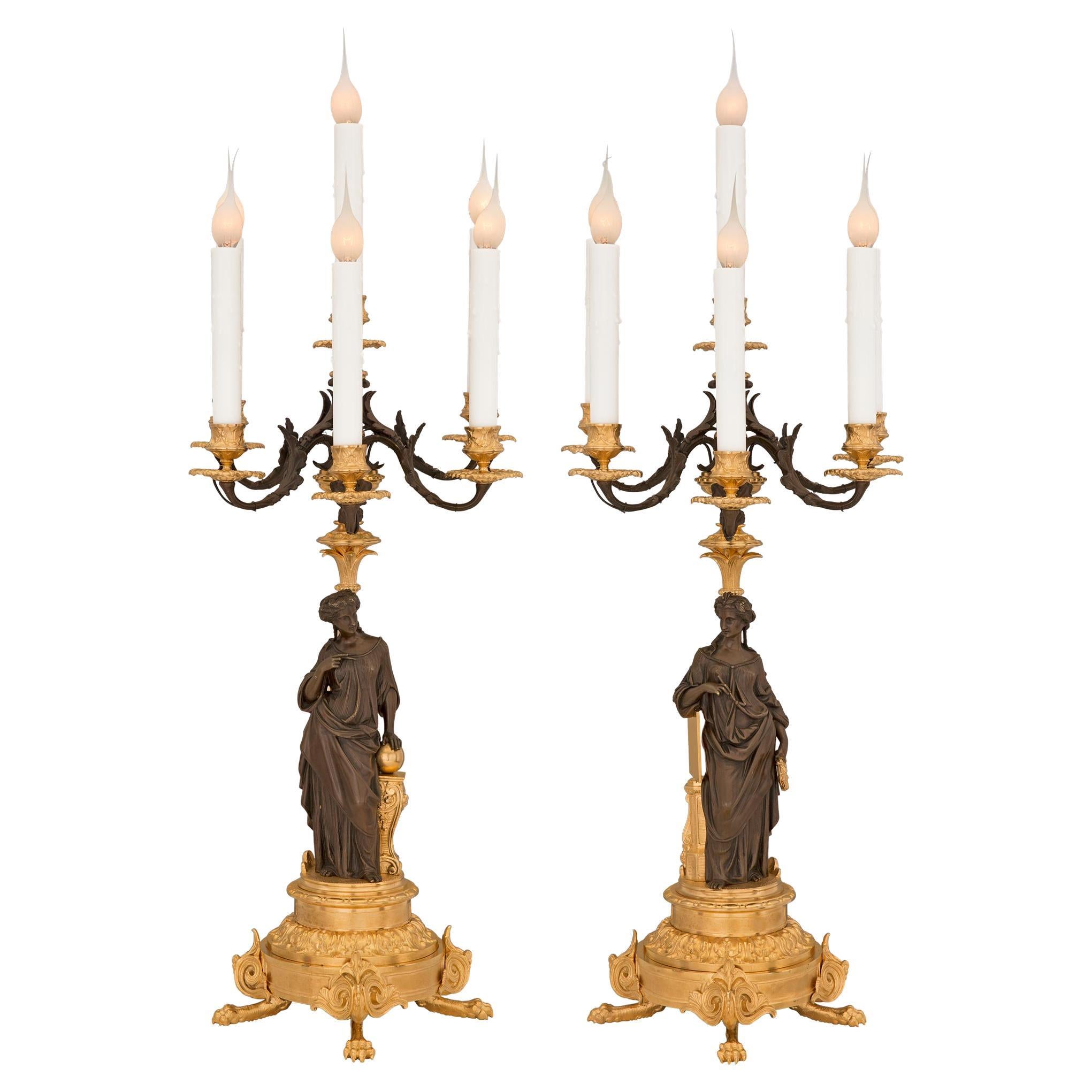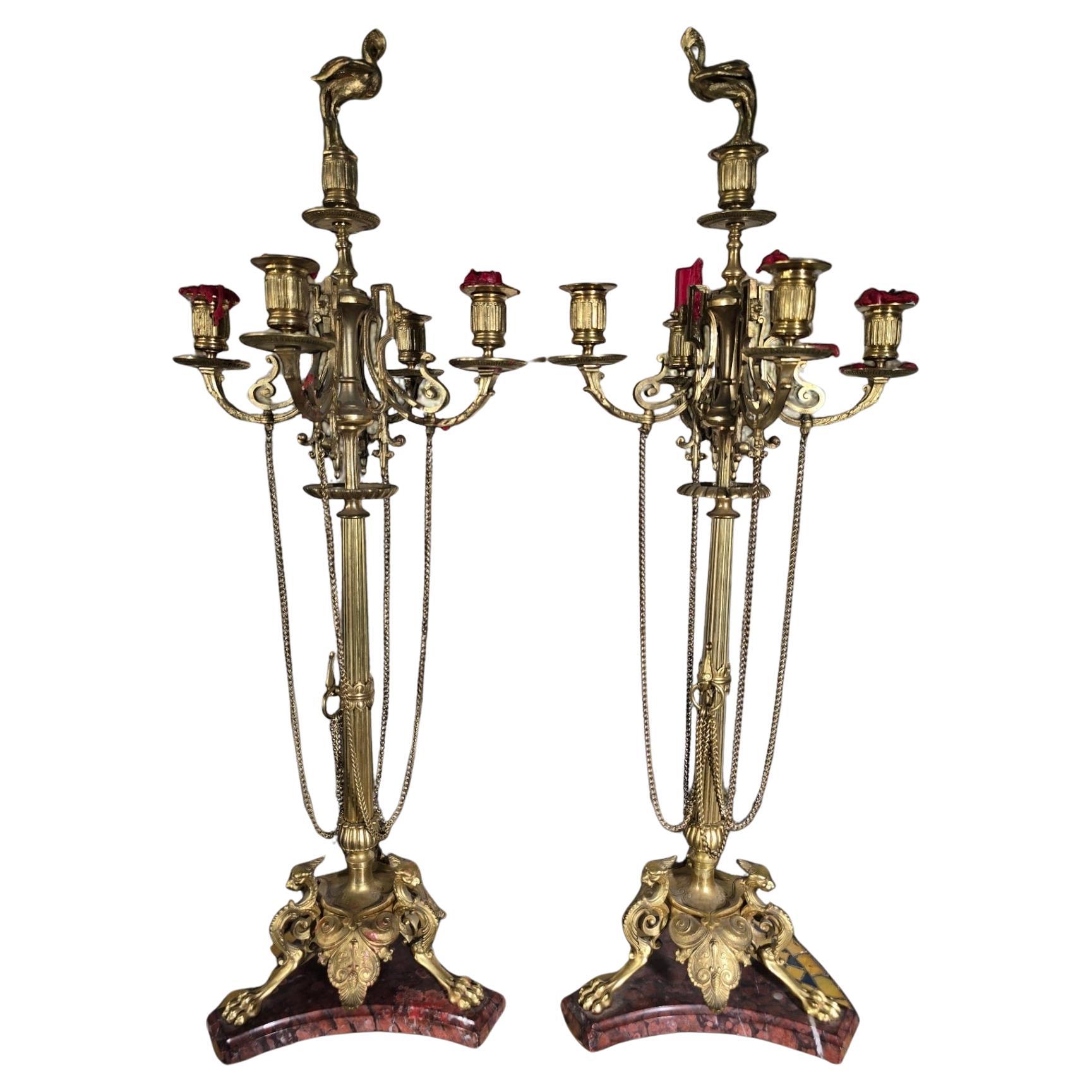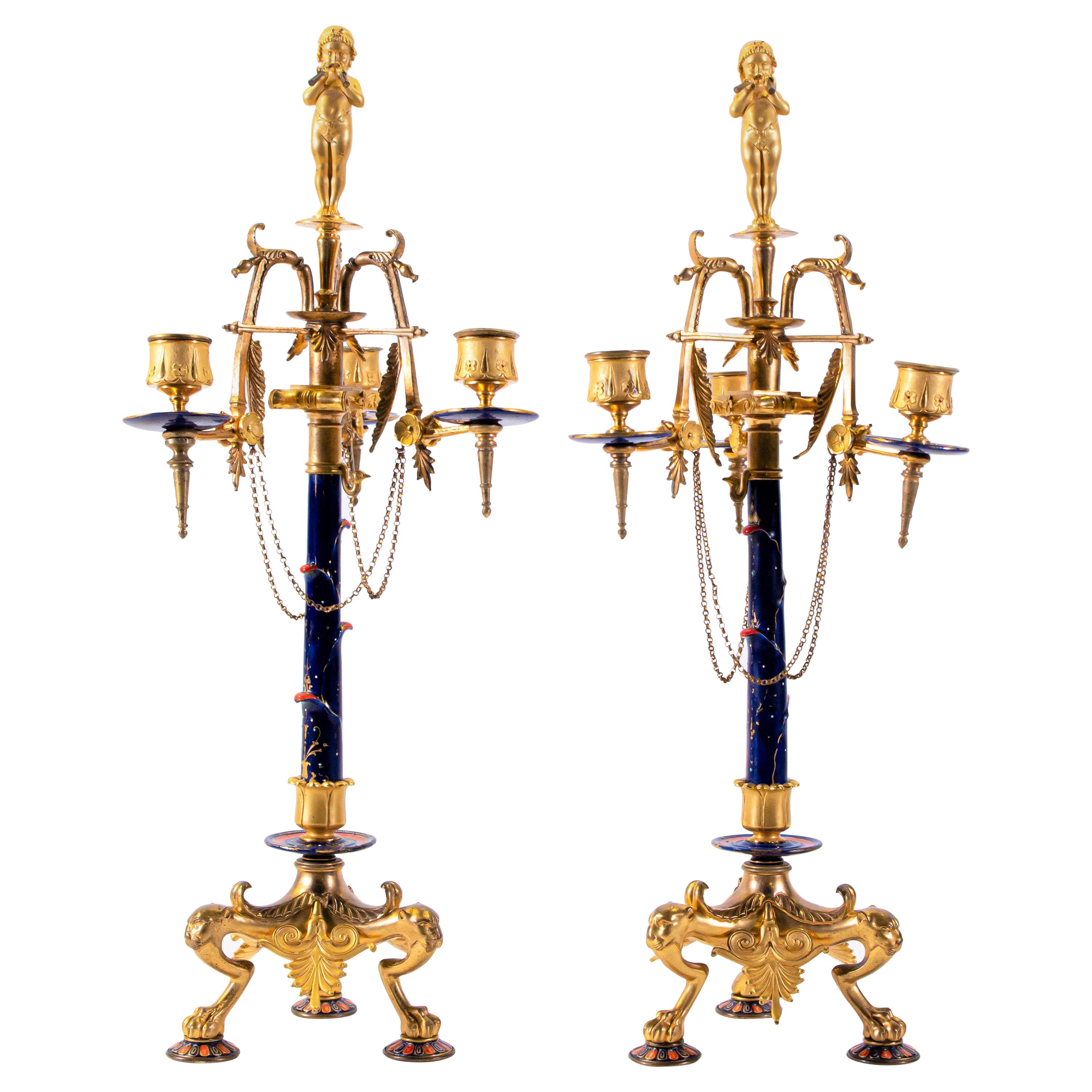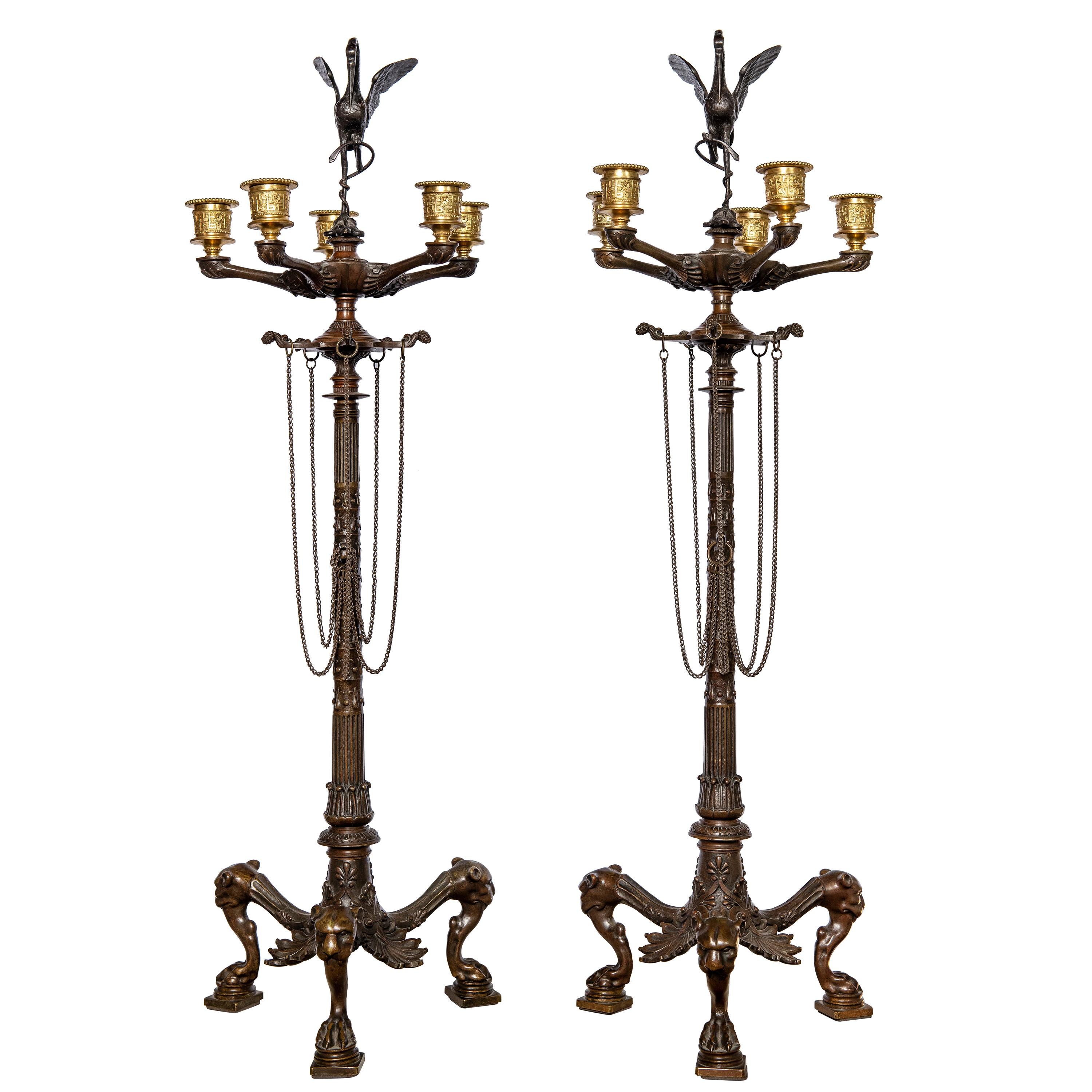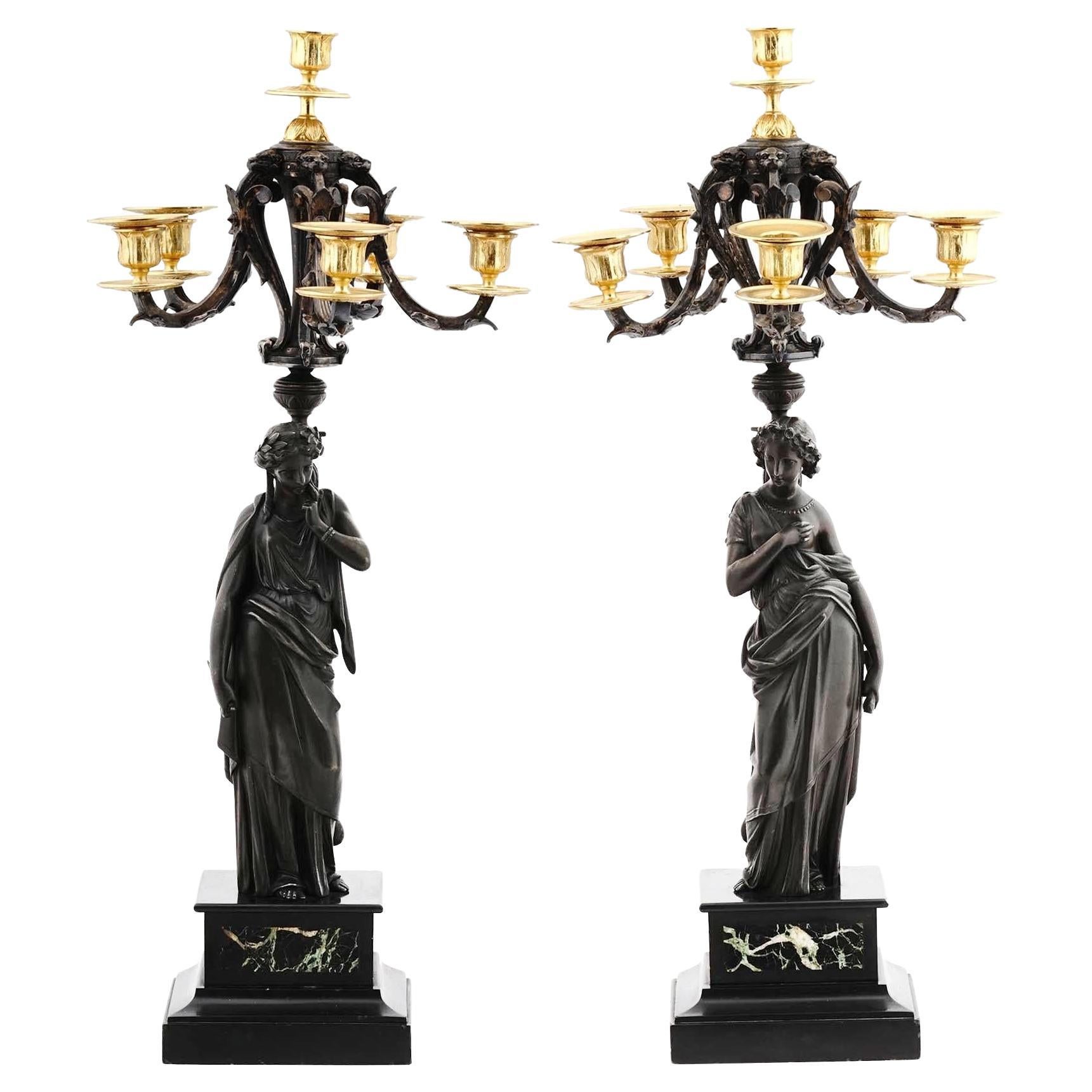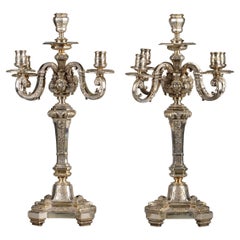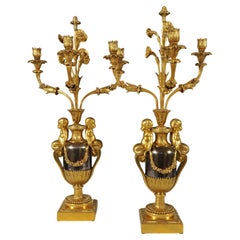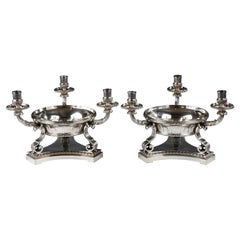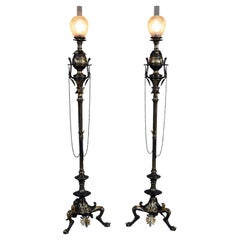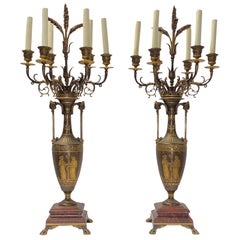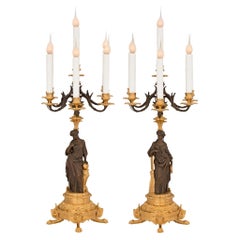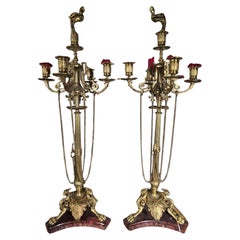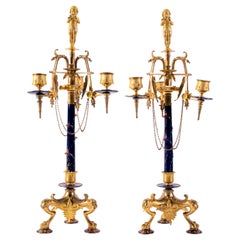Items Similar to Pair of Neo-Greek Bronze Candelabras Attributed to G.Servant, France, Circa 1870
Want more images or videos?
Request additional images or videos from the seller
1 of 8
Pair of Neo-Greek Bronze Candelabras Attributed to G.Servant, France, Circa 1870
$8,179.56per set
$21,930.72per set62% Off
£6,125.86per set
£16,424.42per set62% Off
€6,900per set
€18,500per set62% Off
CA$11,465.70per set
CA$30,741.38per set62% Off
A$12,632.54per set
A$33,869.84per set62% Off
CHF 6,539.37per set
CHF 17,533.08per set62% Off
MX$152,099per set
MX$407,801.68per set62% Off
NOK 82,804.19per set
NOK 222,011.22per set62% Off
SEK 77,789.29per set
SEK 208,565.50per set62% Off
DKK 52,552.07per set
DKK 140,900.47per set62% Off
About the Item
Rare pair of Greek style candelabras made in patinated bronze and gilded bronze, attributed to G. Servant. Each with ten light arms topped by a heron shaped extinguisher. Decorated with various Greek style motifs such palmets, pine cones ans water leaves. Standing on a small triangular architecture presenting a theatre mask and reposing on a tripod base formed with lion paw feet.
Georges Emile Henri Servant (circa 1828-1890), who took over his father in 1855 at their foundry, rue Vieille-du-Temple, in Paris, specialized in the production of neo-Egyptian style clocks, very popular in France since 1860’s, and also the making of Greek style decorative objects. He drew considerable attention to the high quality of his bronzes at the 1855 Paris Universal Exhibition and then at the 1862 London Exhibition. At this time Servant exported up to 40% of his production, principally to the United States, where for instance, his clocks were sold with great success by Louis Tiffany Inc. or Hamann & Roche of New York. But his success came really at the 1867 Paris Universal Exhibition, where he was awarded a Gold Medal for his neo-Greek and Egyptian works (Les Merveilles de l’Exposition Universelle de 1867, t. II, p° 165 & 167). He was even awarded in 1874 the “Ordre national de la Légion d’Honneur”, France’s highest official mark of recognition. Servant participated once again successfully at the 1878 Paris Universal Exhibition, where he not only exhibited vases and small bronze pieces of furniture, but was also a member of the jury for the class of bronze pieces of art. He finally retired shortly before the 1889 Paris Universal Exhibition.
- Attributed to:Georges Emile Henri Servant (Maker)
- Dimensions:Height: 36.62 in (93 cm)Diameter: 16.93 in (43 cm)
- Sold As:Set of 2
- Style:Greek Revival (In the Style Of)
- Materials and Techniques:
- Place of Origin:
- Period:
- Date of Manufacture:circa 1870
- Condition:Wear consistent with age and use.
- Seller Location:PARIS, FR
- Reference Number:Seller: 512/21stDibs: LU3860313625512
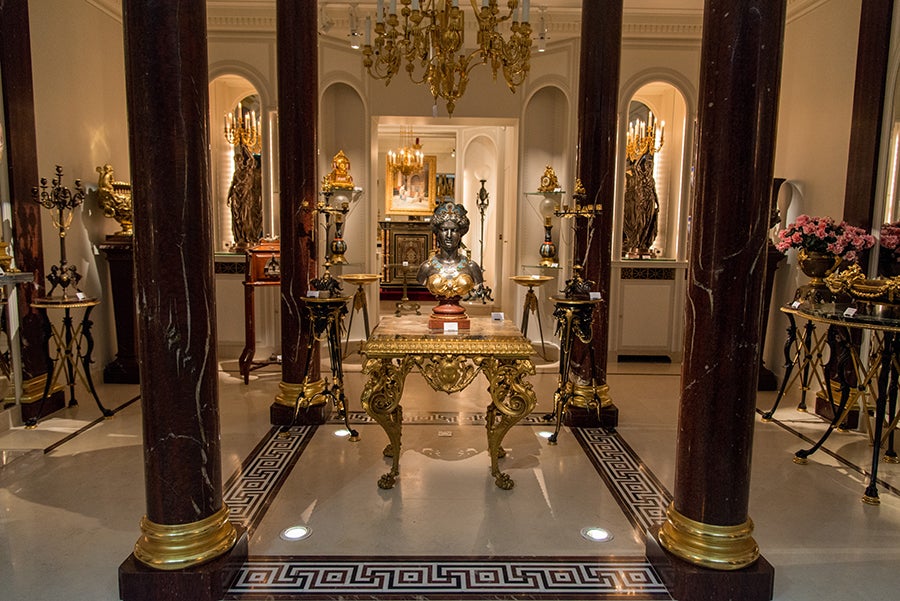
About the Seller
4.9
Gold Seller
Premium sellers maintaining a 4.3+ rating and 24-hour response times
Established in 1997
1stDibs seller since 2018
89 sales on 1stDibs
Typical response time: <1 hour
Associations
International Confederation of Art and Antique Dealers' Associations
- ShippingRetrieving quote...Shipping from: PARIS, France
- Return Policy
Authenticity Guarantee
In the unlikely event there’s an issue with an item’s authenticity, contact us within 1 year for a full refund. DetailsMoney-Back Guarantee
If your item is not as described, is damaged in transit, or does not arrive, contact us within 7 days for a full refund. Details24-Hour Cancellation
You have a 24-hour grace period in which to reconsider your purchase, with no questions asked.Vetted Professional Sellers
Our world-class sellers must adhere to strict standards for service and quality, maintaining the integrity of our listings.Price-Match Guarantee
If you find that a seller listed the same item for a lower price elsewhere, we’ll match it.Trusted Global Delivery
Our best-in-class carrier network provides specialized shipping options worldwide, including custom delivery.More From This Seller
View AllPair of Louis XIV Style Silvered Bronze Candelabras, France, Circa 1880
Located in PARIS, FR
Pair of Louis XIV style five-light candelabras. Chiseled and silvered bronze. Ornamented with palmettes, medallions and feminine masks. Central stem with guilloche motifs, resting on...
Category
Antique 1880s French Louis XIV Table Lamps
Materials
Bronze
Maison Millet, Pair of “ Tritons” Candelabras, France, Circa 1870
By Maison Millet, Pierre Gouthiere
Located in PARIS, FR
Height : 78 cm (30,7 in.) ; Base : 14,5 x 14,5 cm (5,7 in. x 5,7 in.)
Beautiful pair of Louis XVI style amphora-shaped vases in gilded bronze and "canon de fusil" patinated bronze a...
Category
Antique 1870s French Napoleon III Candelabras
Materials
Bronze
Pair of Jardinieres-Candelabras by Boin-Taburet, France, Circa 1880
Located in PARIS, FR
Signed Boin-Taburet à Paris and numbered 34369 and 34370
Lovely pair of Louis XVI style planters with three light arms. Each jardiniere, with their liners in form of a basket based on a three leafy feet and a lobed base. The inner liners are removable.
The two French goldsmiths George Boin and his son-in-law Emile Taburet created around 1875 in Paris the company Boin-Taburet. They made many silver pieces inspired by the beautiful services of the eighteenth century. At the Paris Universal Exhibition of 1878, Georges Boin presented a “service de toilette” inspired by the work of François-Thomas Germain (1726-1791), and then at the Universal Exhibition of 1889, several epergnes, including one of them executed after drawings by the famous artist Juste-Aurèle Meissonier (1695-1750), as well as tea sets of Louis XIV, Louis XV and Louis XVI styles. Boin-Taburet firm also exhibited a tureen and platter after Pierre Germain...
Category
Antique 1880s French Louis XVI Table Lamps
Materials
Bronze
Pair of Neo-Greek Floor Lamps Attributed to G. Servant, France, Circa 1870
By Georges Emile Henri Servant
Located in PARIS, FR
Rare pair of Greek style floor lamps made in patinated bronze attributed to G. Servant, each surmounted of a frosted glass globe engraved of stars and a Greek motif frieze. The body of the vase, decorated with Greek style patterns such as palmets, Greek motif frieze and water leaves, stands on a shaft decorated with deer heads. Fine chains are connected to a delicate butterfly. The set is based on tripod legs with lion claw feet alternating large palmets.
Height : 183 cm (72 in.) ; 213 cm (83 3/4 in.) with glass shades ; Diameter : 43 cm (19 2/3in.)
Georges Emile Henri Servant (1828-c.1890), who took over his father in 1855 at their foundry, rue Vieille-du-Temple, in Paris, specialized in the production of neo-Egyptian style clocks, very popular in France since 1860’s, and also the making of Greek style decorative objects. He drew considerable attention to the high quality of his bronzes at the 1855 Paris Universal Exhibition and then at the 1862 London Exhibition. At this time Servant exported up to 40% of his production, principally to the United States, where for instance, his clocks were sold with great success by Louis Tiffany Inc. or Hamann & Roche of New York. But his success came really at the 1867 Paris Universal Exhibition, where he was awarded a gold medal for his neo-Greek and Egyptian works (Les Merveilles...
Category
Antique 1860s French Greek Revival Floor Lamps
Materials
Bronze
Pair of Neo-Greek Floor Lamps Att. to Lacarrière, Delatour & Cie, France, C 1860
By Lacarrière, Delatour and Co.
Located in PARIS, FR
Measures : Height without globe: 188,5 cm (74,2 in.) ; Base : 45 x 45 cm (17,7 x 17,7 in.)
Pedestal height : 136 cm (53,5 in.)
Lamp height : 52 cm (20,4 in.)
Beautiful pair of neo-G...
Category
Antique 1860s French Greek Revival Floor Lamps
Materials
Griotte Marble, Bronze
Pair of Bronze Putti Torcheres Attributed to v. Paillard, France, Circa 1870
By Victor Paillard
Located in PARIS, FR
A pair of two patina bronze torcheres attributed to V. Paillard. Each modelled as a pair of putti holding aloft a large foliate shaft issuing eleven berried-acanthus scrolled branche...
Category
Antique 1870s French Napoleon III Floor Lamps
Materials
Bronze
$199,154 Sale Price / set
55% Off
You May Also Like
Pair Antique Greek Revival Franz Barbedienne Bronze Candelabra
By F. Barbedienne Foundry
Located in New York, NY
Pair of large French 19 century Greek Revival patinated bronze candelabra with gilt highlights on Rouge marble bases. Wired as lamps. Signed F. Barbedienne Fondeur.
Category
Antique 19th Century French Greek Revival Table Lamps
Materials
Marble, Bronze
Pair of French 19th Century Renaissance St. Bronze and Ormolu Candelabra Lamps
Located in West Palm Beach, FL
An impressive true pair of French 19th century Renaissance st. patinated bronze and ormolu candelabra lamps. Each six arm lamp is raised by handsome paw f...
Category
Antique 19th Century French Renaissance Table Lamps
Materials
Bronze, Ormolu
Elegant Pair of French 19th-Century Greek-Style Candelabras
Located in Madrid, ES
This exquisite pair of 19th-century French candelabras is crafted from finely chiseled bronze in the Greek style. Each candelabra features a luxurious base made from royal red marble...
Category
Antique 1890s Table Lamps
Materials
Bronze
Pair of Neo-Grec Style 3-Arm Dore Bronze and Enamel Candelabras, F. Levillain
By Ferdinand Levillain
Located in New York, NY
A gorgeous and highly unique pair of 19th century French Neo-Grec style three-arm doré bronze and enamel candelabras, Attributed to Ferdinand Levillain, Stamped L C. Each candelabra ...
Category
Antique 1880s French Greco Roman Candelabras
Materials
Bronze
Pair of Gilt and Patinated Bronze Candelabra, France, 19th Century
Located in Buenos Aires, Buenos Aires
Pair of gilt and patinated bronze candelabra. France, 19th century.
Category
Antique 1870s French Napoleon III Candelabras
Materials
Bronze
Pair 19th Century Neoclassica French Patinated & Gilt Bronze Figural Candelabra
Located in New York, NY
Pair of antique (19th century) French candelabra in the Roman neoclassical style depicting patinated figures of females in classical robes supporting six candle arms and standing on ...
Category
Antique 19th Century French Neoclassical Revival Candelabras
Materials
Marble, Slate, Bronze
More Ways To Browse
Gilt Bronze Patinated Lamp
Gilt Bronze Candelabra Lamp
Antique Lamps 1870
Tiffany Table Lamp Base Only
Tiffany Style Bronze Lamp Base
Large Ceramic Table Lamps
Skyscraper Furniture
Red And Blue Table Lamps
French Porcelain Lamps
Vintage Bamboo Lamps
Blue Glass Dining Table
Painted Metal Table Lamps
Enamel Stove
Glass And Copper Dining Tables
Orange Midcentury Table Lamp
Vintage Wood And Brass Lamp
Vintage Adjustable Table Lamp
Italian Marble Base Table Lamp
